Providing FREE vegetarian meals during times of natural disasters
- Chapter 2 –
Trying To Grow Up
The Captain glanced at the rows of dials on the instrument panel and took one more look at his watch. It was July 9, 1953.
Rubbing the back of his neck he figured that it was just about time to ask Jerry to take over. He wanted to pour himself that cup of hot coffee and find out what his wife had packed for lunch.
In every direction the view was fantastic. This time their flight had taken them right over some of Alaska’s most gorgeous, snow-covered peaks—one of them towering nearly twenty-one thousand feet above sea level.
Having left late that morning from Elmendorf Air Force Base, near Anchorage, their sleek bomber was fully loaded with fuel for the long flight toward the Russian border. World War II may have ended in victory but concerning those “darn Russians,” you just couldn’t trust them. This is why his crew was up there at fourteen thousand feet in the first place, carrying on board an atomic bomb.
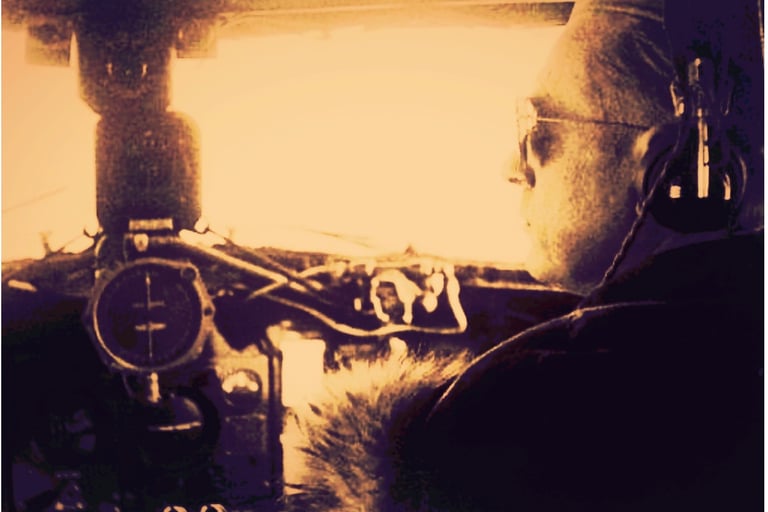

photo by: Lt. Col. Winston E. Boutelle, USAF
Again the Captain’s attention was drawn to the awesome mountains below. It was perfect flying weather. Reaching behind his seat to double check his lunch, an enormous flash of blinding light, followed by a thunderous roar, shook the aircraft from end-to-end. Everything quickly went black as the plane became engulfed in billowing smoke. With perfect reflexes the Captain grabbed the control stick and gave the engines full throttle. The huge bomber abruptly strained, every inch of it trying to comply with the evasive maneuver suddenly demanded. Needless to say, this sent everything not tied down, including the hot coffee, books, and even an unsuspecting airmen in the back of the aircraft, smashing onto the metal floors. But oddly, Captain Snyder also noticed that his airplane had responded perfectly to his command. Except for the initial blast, he seemed to be in complete control, but “what in the world just happened?”
Actually, the question was just a way to express his greatest fear. “For crying out loud Jerry, we must have dropped that damn bomb, God forbid if the bomb-bay doors were never locked properly! Man, is there going to be holy hell to pay when we get back to the base.”
“Jack, this is the Captain, go down and see if the bomb-bay doors are open. In the meantime, Jerry, I’m going to circle around to take a look.”
Soon the bomber brought them back onto their original path. “Jesus Christ Jerry, will you look at that! See that mountain peak we just flew over?”
“My God, Sir, it’s no longer there! Just look at that destruction!”
“Captain, this is Jack, everything looks A-OK down here. The bomb is in its rack and the doors are locked tight as a drum.”
Meanwhile, back in Anchorage, my little brother and I were outside playing in a large pile of sand when some of the other children started saying something about the odd colors in the sky. It wasn’t too much longer before Ava came rushing out to get us and said to come inside the house, right that minute.
In the kitchen Mom was listening to the radio and a reporter was telling everyone that because of the volcanic ash beginning to fall on Anchorage, no one should venture outdoors except in an extreme emergency. By two o’clock in the afternoon, when it should have been broad daylight, instead it was pitch-black.
Many years later when I asked my father about this, he told me about a friend of his who was flying toward the Russian border inside a bomber carrying a nuclear bomb. Completely unexpected, at the exact second he flew over Mt. Spurr, the volcano erupted.
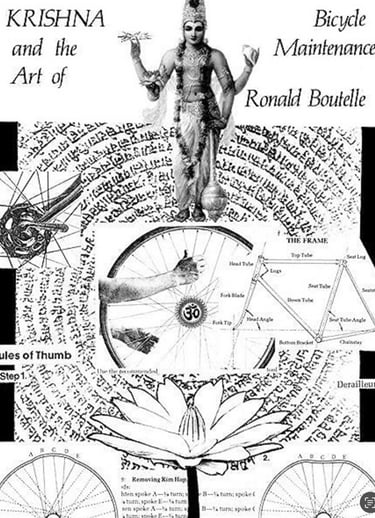

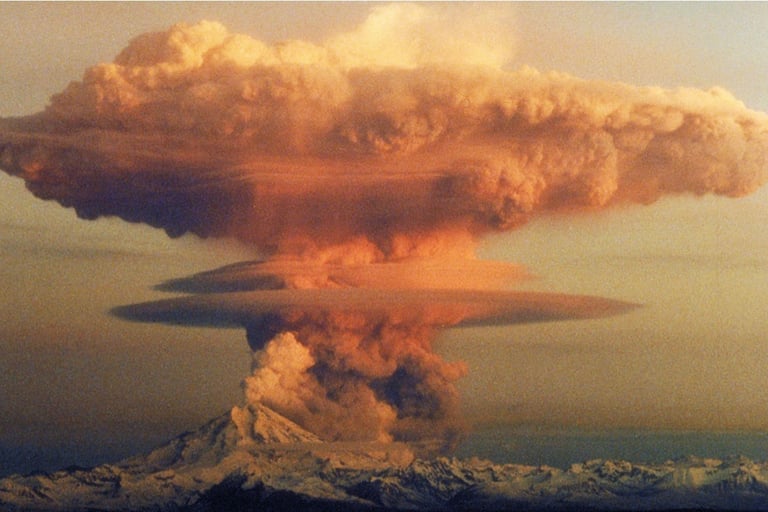

Volcanic Eruption
photo by: United States Geological Survey
One of the things being a “military brat” means is that you move around a lot. Dad’s next assignment was at March Air Force Base which is located on the outskirts of Riverside, California, almost thirty-six hundred miles south of Anchorage and about an hour’s drive east of Los Angeles.
But unlike many military families we were fortunate to live off base, going there only to shop for groceries or taking an occasional swim at the Officer’s Club.
So Riverside, itself, was to be our new home for the next seven years—as complete a change from the cold, wintry wilderness of Alaska as a person could imagine. Instead of mountains of snow we now had several palm trees growing in our front yard.
Best of all, year round I could now play outside with my friends, hardly ever needing my winter jacket. Without a doubt I spent the happiest years of my life in Southern California playing football, swimming at Laguna Beach and Glen Ivy Hot Springs; exploring the Santa Ana River; climbing Mt. Rubidoux; riding my bicycle and going to the movies on Saturday afternoons. As a matter of fact, the only anomaly I was ever aware of was my older sister.
Ava was a beautiful girl, but it seemed like she was always at odds with my father. I can still picture the two of them having a big argument about Elvis Presley, who was the latest rock-and-roll star. Dad bet her fifty dollars that Elvis was just another overnight fad and that by the following year no one would even remember his name. Gladly accepting his challenge, off she went with her girlfriends to see the grand opening of Elvis’ newest movie. I’ve often tried to imagine what it was like inside that jammed-packed theater because unless you were a girl, the Fox Theater on 8th street wouldn’t let you in!
By the time she reached fifteen, Ava had dropped out of high school, arguing vigorously that with her new job at the health spa she was making more money than even dad, who was now an Air Force captain and flying B-47s.
She also began telling me strange tales of men in faraway India called yogis, and how any one of these half-naked mystics could lie down and control his breathing and heartbeat so well that even a doctor would certify him dead.
Later she pleaded with me to go with her to the Giant Rock Flying Saucer Convention, but that was totally out of the question. I just wasn’t impressed with her far-fetched ideas. Besides, I was much more interested in playing with my friends than taking a long drive out into the hot desert.
Not one to give in easily, she then convinced my little brother into going. When he got back that evening he told me about a cloud that mysteriously kept appearing and disappearing and a photograph someone took of it, revealing the outline on the negative of a flying saucer behind it.
The following week, again Ava approached me but this time she wanted me to go with her to meet “a wonderful person” she had recently met. His name was H. Charles Berner and was living near Riverside, in a place called, San Bernardino. In order to keep the peace I reluctantly went along, but all I recall of our meeting is shaking his hand and seeing a group of grownups in his living room. Ava said something about him being a Scientologist, but I just wasn’t interested and wanted to get back home and ride my bike.
Dad laughed when he thought about it, trying to imagine the expression on that poor pilot’s face as he mistakenly thought he had dropped the first atomic bomb on America.
*** ** ***
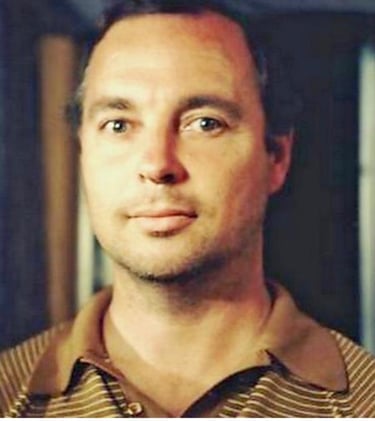

Early 1950s photo of Charles Berner
During the winter of 1956 Dad got orders again, but this time we were headed for England and a small Royal Air Force base located near the Yorkshire Moors. Back at March Air Force Base Dad’s doctor had detected a minor heart murmur and although it wasn’t serious, the condition wouldn’t allow him to fly anymore. This is why we were now going to England. Instead of flying, he was assigned to the Thor missile program that was fast becoming a vital force in NATO’s defense of Europe.
The small town where Larry and I would be going to school was located only a few minutes away by double-decker bus and was called, Great Driffield. Actually there were two identical schools sitting side by side, one for boys and one for girls.
Really bizarre, the predominant mood at school seemed to be a kind of love-hate relationship between the overwhelming number of British boys and the approximately thirty Americans also enrolled there.
Except for Larry, myself, and another officer’s son, the other American students lived in a large trailer park which served as housing for the hundreds of Lockheed Aircraft employees who had been contracted to build the missile sites. Invariably, at recess, I would find a large crowd of English boys religiously following a small group of American boys, treating them as if they were demigods who had just arrived from some distant world.
Besides not being accustomed to such peculiar treatment from my classmates, there were a lot of other things at school that seemed unusual. Lunch, for instance, was all you could eat for fourteen cents and it seemed like every British boy who ate with me used an excessive amount of salt on his food. The salt shakers didn’t have perforated lids but rather just one nipple-like opening that let the salt come out in a quick stream.
One of my odd assignments was making ink for my history teacher and pencil sharpeners were strictly forbidden. If your pencil got dull you had to use a jackknife to sharpen it and it was mandatory that you carried one in your pocket. However, the most significant difference between the school I had just left in Riverside and my new school in Great Driffield were the constant beatings dished out by the teachers. My science teacher actually picked me off the ground by my ears!
As I mentioned, the girls had an identical looking school next to ours but the two were separated by a twenty-foot strip of grass that was strictly off-limits. Another favorite pastime was to stand with all the other boys, right up against this no-man’s land, and throw large English pennies at the girls, who were also standing in a big group on their side, gawking at us.
My little brother and I had been attending school for less than two months when without warning, overnight all the American boys abruptly left with their parents, headed back to California. Lockheed’s work in England was completed.
A few weeks later I arrived at school one morning but was told to immediately report to the gymnasium. I thought this request was a bit out of the ordinary but then again, maybe there was going to be a special event. Little did I know!
Upon entering the gym I could see that the bleachers were already filled with boys and in the middle of the floor was a full-size boxing ring. I was also aware that every kid in the place was yelling at the top of his lungs and for some strange reason they seemed to be yelling at me. Over by a table next to the wall, the gym teacher spotted me and grabbing my arms, started to force my hands inside a pair of red boxing gloves.
As you can imagine, I was extremely frightened and then it dawned upon me what was going on. You see, once the other American students had left for America (leaving just the three of us military boys in the British school), the whole climate changed. Now all their pent up resentment toward Americans could be easily vented, using the boxing match as a convenient excuse. In other words, I was simply a sitting duck ready to slaughter. Also, mind you, I am not a very big person, even fully grown, what to speak of when I was just fourteen. Furthermore, there’s the fact that I had never been in a real fight in my entire life. I was 5 foot 4 and weighed under 120 pounds.
Needless to say I became terrified as I began to put two and two together, but I also knew that I had no choice in the matter. For one thing, I had already seen far too many examples of the punishment the teachers could hand out. I knew if I didn’t get beat up in the ring, then the gym teacher would gladly do it himself. For a second I even thought of making a run for it, but that was also impossible because I was completely surrounded. Without delay the gym teacher finished shoving my hands inside the red-leather gloves and after lacing them up, ordered me to get into the ring. Obviously it wasn’t just the British boys who wanted to see an American get beat up, but the teachers, too. How else could everything have been all set up, first thing in the morning, with everyone already there? No, this had all been carefully planned out.
With my heart pounding, in the other corner of the ring I could see the boy I was supposed to fight. I recognized him right away because he was in most of my classes. Although we may have been the same age and in the same grade, the comparisons stopped there. Of all the kids in school he was one of the strongest. He was most accurately described as a big, strong, farm boy, towering at least six inches above me. As for myself, I was just a frightened little boy who was trying to adjust to a new and unusual school, located in a foreign country, far away from everything I was accustomed to.
Feeling my hands sweat inside the hot gloves, every kid in the place was standing in a frenzy when their screams were pierced by the sound of a loud bell. This was the signal for us to start the fight and immediately the English boy reacted, coming straight for me. At this point I can’t remember exactly what went through my mind, but I certainly knew there was no way to get out of that ring without a fight. I think instincts then took over.
To protect myself I did the only thing I knew how to do with any confidence, and so, like a human windmill, I began rotating my arms as fast as I could, charging the boy in front of me with all my might. And that was it. Suddenly, enormous amounts of red blood came gushing out of his mouth and to the complete amazement of everyone watching, including me, several teachers went running over to him with wet towels and stopped the fight. I had just won my first and only boxing match. It lasted less than 15 seconds.
With that behind me and a newly-won respect from my classmates, both my brother and I began to settle down. We actually enjoyed the next year at school. As a nice surprise for Christmas, Dad treated the whole family by taking us to Switzerland where we stayed at a ski resort.
To complete his tour of duty, Dad was scheduled to spend a total of three years with the missiles at Great Driffield. However, with not even half this amount of time behind us, my mother died after a tragic accident. With fate having suddenly reared an ugly head, once again my little brother and I were in for another drastic change. Without our mother, Dad had no choice except to take us to live with his parents in Corinth, New York.
Ava didn’t come with us because while we were still in England she married Frank, who was an American engineer who worked for Lockheed. They moved to Southern California to study Scientology.
The largest item that Larry and I brought back to America was the red go-cart Dad had bought us after our mother had passed away.
One day its fuel tank was empty and while trying to siphon some gas out of my uncle’s car, Larry accidentally swallowed a large mouthful of gasoline. I wasn’t there at the time, but later I heard that Grandpa had to rush him to the hospital in Saratoga Springs where the doctors had him drink a radioactive solution in order to take some X-rays. Although this sounds quite horrible, when I saw Larry later that evening and asked him how he felt, he didn’t voice a single complaint. In fact, he went to school the next day as if nothing happened.
To everyone’s great surprise, a few weeks after this accident with the gasoline, Ava unexpectedly called from California. She told my grandmother that she had recently divorced her first husband and had just remarried. She was again on her way to England, this time to study in Saint Hill where L. Ron Hubbard had established his headquarters and was personally teaching the latest courses in Scientology.
A few days later she and her new husband arrived for a short visit and right away I recognized Ava’s new beau as the person she had taken me to meet several years ago in San Bernardino: Charles Berner.
As I got to know him better, I learned that Charles was a famous Scientologist and according to L. Ron Hubbard, he was unquestionably their most expert practitioner, having received all their highest honors.
With Ava being Ava, she always had something incredible to tell me and now her latest crusade, besides Scientology, was vitamin B3 (niacin—specifically the form called, nicotinic acid.) While we were all waiting in the living room for Grandmother to call us for dinner, Ava said that if Larry and I were to take some, our skin would flush red because the vitamin stimulated the release of radioactive poisons stored in the body—especially radiation that had been stored in the bones. At this point in time, what had happened to Larry in the hospital had never been discussed.
Charles was sitting comfortably and further explained that back in the early fifties he had experimented with the vitamin on some of his students and had attained irrefutable evidence regarding niacin and its relationship to radioactivity. The whole idea was that the vitamin was nature’s simple remedy for radioactive poisoning and would be especially useful if our country were ever attacked with nuclear weapons. In other words, it was the perfect radiation-sickness medicine, available for pennies in any drugstore.
Charles then told us about a soldier who had observed an atomic blast in Nevada while standing behind a picket fence. Several years later Charles gave him some niacin and his skin began to immediately flush red, except for white areas on his chest which took on the exact pattern of the fence he had stood behind during the detonation. This, Charles said, was because the wooden slats had stopped the radiation from entering the man’s body.
Charles continued to explain that in a second experiment he had taped a wide “X” on a volunteer’s back, asking him to lie out in the sun until he got a sunburn. Charles pointed out that because the distant sun is actually just a huge nuclear explosion, a sunburn is just like the radiation burns from an atomic blast, but much milder. Later that day when the tape was removed from his volunteer’s back, there was a large white “X” on it where the skin had been covered by the tape.
After several weeks when the sunburn had completely vanished and all the skin had returned to its normal color, Charles gave him 200 mg. of niacin and sure enough, the person’s skin also erupted in red and white blotches. But where the tape had been, a distinctly visible “X” appeared, proving the relationship between the vitamin and radiation.
While Charles was completing his story, Ava disappeared for a few minutes, soon returning with her purse and a small bottle of niacin.
Again she suggested that Larry and I might like to try some and promised that we wouldn’t be hurt because the vitamin was water soluble and she would only give us a small dose, which she did. Personally, after I took the niacin I didn’t notice a thing but Larry, on the other hand, began to feel very uncomfortable—so much so that he insisted on removing his shirt. I cannot stress enough how uncomfortable he felt.
When he finally pulled his T-shirt off, the three of us looked in total disbelief at the incredible pattern that had suddenly erupted on his bare skin. Just as Ava and Charles had been describing only seconds before, Larry’s whole body seemed to be on fire. But I don’t think anyone was quite ready for what we saw: the exact imprint of a human skeleton, on both his chest and back. It definitely wasn’t a case of having to stretch our imagination to see it because the images were perfectly clear, just as if an expert artist had drawn them on purpose.
After I told Charles what had happened to Larry at the hospital, he told us that the images of his skeleton had appeared because of the radioactive solution and X-rays Larry had taken at the hospital and consequently, the release of the radiation that had settled within his bones.
For the first time ever, Ava actually gained some credibility with me and I especially liked her new husband. From then on, when either of them would talk with me I became spellbound with their fascinating accounts of flying saucers, health foods, and Scientology. They only stayed a few more days before going to England but I would never forget them or what I saw happen to my little brother—I still haven’t.
*** ** ***
When I came home from school one day, not long after Ava and Charles had left, Grandma said Larry had taken a bad fall in the gymnasium. The teacher had suspended a thick rope from the ceiling and one by one the boys were taking turns climbing to the top, exactly like countless numbers of children had done before. But when it was Larry’s turn and he reached the top, somehow he passed out and fell to the mats below.
Of course I wanted to see how he was and went upstairs to find him. He assured me that he felt fine and not to worry; that it was nothing and he hadn’t hurt himself. Seeing for myself that he was all right I didn’t think much about it, and besides I had to get ready to go over to my girlfriend’s house at seven.
Some months later I had another date with Nancy. By the time I got home from her house, the nine o’clock news was playing on the television and Grandpa wanted to know if I knew where Larry was. All I could think of was that he had walked over to see his new girlfriend who lived somewhere on the other side of the Hudson River. I told them not to worry, that Larry would be home soon. Being quite elderly, both Grandma and Grandpa went to bed. With nothing to do, I also fell asleep.
Both Larry and I had grown up over the years with little to no supervision and we had always been trusted to come and go as we pleased. So when he was a late walking home it didn’t seem like such a big deal, even if it was in the dead of winter and only five degrees above zero. After all, I had walked home from Nancy’s house on many nights just as cold as that.
The next morning, about 5:00 a.m., I suddenly woke up, instantly aware that Larry wasn’t home. In a panic I jumped out of bed, knowing that something was dreadfully wrong. Larry was only fourteen and even though one of us might occasionally stay out late, we never stayed out all night.
I got dressed as fast as I could, ran downstairs and out onto the back porch. It was there, under a tree in the backyard, illuminated by a full moon, that I found my little brother frozen to death in the deep snow. Grandpa said that he must have climbed the tree earlier that evening when the same thing that made him pass out and fall in the gymnasium, happened again outside. Doctor Vinicor told us that in less than thirty minutes after falling to the ground, the snow under the back of his neck had taken his life—more than likely two hours before I even got home. During those two short years I lost both my mother and my brother.
My grandparents and all my relatives were very kind to me and Corinth soon became my home and became very dear to me. There was just something very enchanting about the Adirondacks that captivated my soul. However, I was also fearful of falling further behind in my grades, which can easily happen when uncontrollable circumstances like these force one to move around so much. Realizing this, I tried hard to settle down into a routine at school. I began going steady with Doctor Vinicor’s daughter, Nancy. I also joined the school’s ski team and played baseball.
When you are sixteen, with such enormous pressures on you, the pangs of life are quickly pushed aside. I also became best friends with Bruce Carpenter. Bruce’s own brother had died in a car accident and soon after Larry’s death, Bruce sort of adopted me. For the remainder of our high-school years we became best of friends.
From what Bruce told me, probably in the late 1930s, Bruce’s dad, Beecher Carpenter, and his uncle Len, had built a hunting camp near Minerva, New York, which is located in the heart of the Adirondacks.
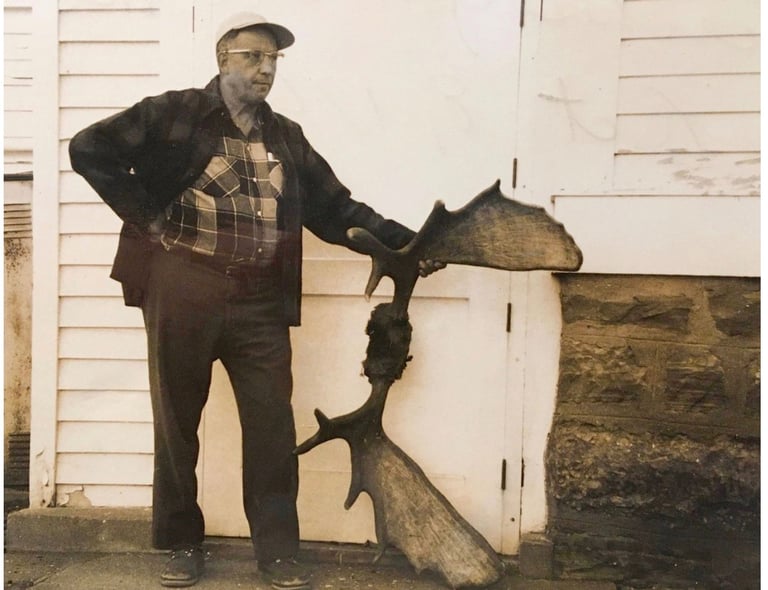

Beecher Carpenter - 1963
photo by the author
As time went on, Bruce and I spent as many weekends as we could up there. Among other things we fished for brook trout in the Boreas River, did repairs, and worked his trap lines which stretched the entire distance from Corinth, all the way past his camp, over into Huntley Pond.
All at once I found myself part of a very exclusive sportsman’s paradise, saturated with the incredible mystique of the Adirondacks. Everything about the camp: its intriguing smell; how old it was; who had built it; its location; all the antlers nailed along the porch; the beautiful drive to get up to it from Corinth… all these things seemed to beckon me to become fully absorbed in this rugged lifestyle and I was more than willing.
Bruce had been taught everything he knew about the outdoors by his dad, who was both an American Indian and a registered state guide. So going out into the woods with Bruce was the real deal. Before long I learned what clothes to wear and how to tie a short rope around my wool coat to create a bag-like cavity to keep my lunch and spare gloves in. Eventually I even got rid of my Winchester and bought a .35 Remington Pump Gamemaster, exactly like the one Bruce carried.
In particular, I’ll never forget one of the earliest adventures we shared. We were both in the tenth grade at Corinth Central High School and with Thanksgiving vacation fast approaching, naturally we both wanted to go deer hunting. My grandfather agreed to drive us to Minerva and then to camp. After he let us off, we got our gear organized and settled down over a topographical map to plan our strategy for the next day. Before darkness fell, Bruce helped me set a trap.
When morning came, we dressed, fixed breakfast, packed some sandwiches, and took off at the first hint of light—following a creek to where the trap. Earlier he told me that I was wasting my time because without removing my scent from it I would never catch a thing. But when we finally located it, to our great surprise a mink was in it. Trapping was the way that Bruce’s father had taught him to earn money for school clothes and Bruce seemed happy that our first day out was starting out so successful.
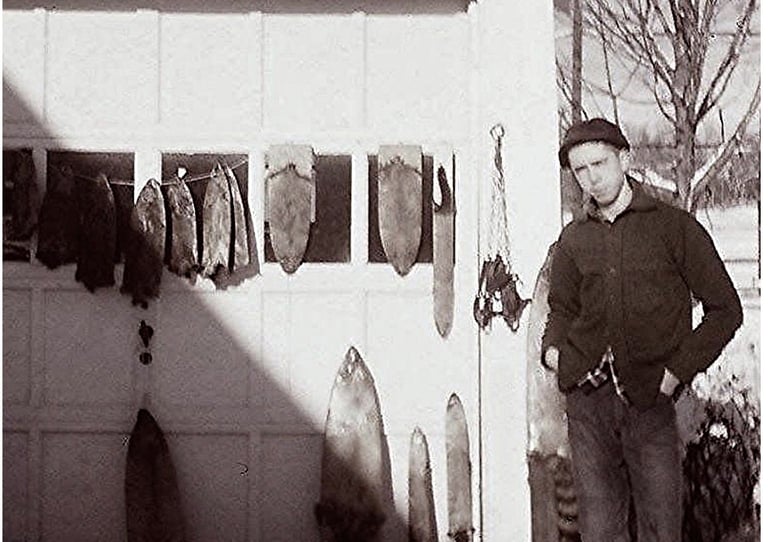

Bruce Carpenter - 1964
photo by the author
From there we walked about two more miles, through a dense forest, over the old wooden bridge spanning the Boras River, and then up a dirt road to the aluminum-pie pans that marked the trial leading to Pine Mountain. In fact, the entire trail had been marked out with pie pans. When I asked Bruce why, he told me that at night, hunters could use their flashlights and follow the reflections all the way back to the road. But this was a very desolate part of the Adirondacks and at least on that particular November day in 1962 there wasn’t a single other hunter for miles around. We were really on our own, with Bruce in the lead, always ready with his .35.
After walking down the trail for about twenty minutes, Bruce abruptly stopped and told me to listen. Off into the distance I could hear a deep roar and I turned to Bruce. He told me that the sound was coming from the Hudson River, about a mile up ahead. When we finally reached Pine Mountain and the majestic river below, the terrain reminded me of the layout of the Grand Canyon, but on a much smaller scale.
Even though I was trying to act like a seasoned hunter, the vast scope of this unbelievably rugged area, along with not really knowing where I was and the long distance we had already traveled on foot (about eight miles), had left me feeling quite apprehensive. This was nothing like climbing Mt. Rubidoux as a young boy back in Riverside, which was just a tame little hill compared to all of this.
Not having seen any deer, Bruce said we should stay on the bluffs overlooking the river and head upstream over to Kettle Mountain which was the next major landmark, upstream. At any moment we both expected to see something because earlier we had seen bear tracks and the snow was covered with fresh deer signs.
Not quite two hours later, after we toasted our sandwiches over a small campfire, Bruce said that he would give me precisely one hour to circle around Kettle Mountain, where I was supposed to come across Mink Pond Brook and follow it down toward the Hudson River. There I was to find a good vantage point to watch for any deer that he would be scaring toward me. Actually, Bruce had given me the easy part and his plan sounded quite feasible until I got lost.
Sure enough, because I was such a greenhorn and really didn’t know where I suppose to go, I failed to make a wide enough circle and inadvertently cut toward the river much too soon. Due to this mistake, instead of finding Mink Pond Brook, I came out onto a small glen that was covered in deep snow. After a few more steps forward, a panoramic view of the entire Adirondacks opened up, dazzling me with its unexpected grandeur. From this unobstructed butte I could clearly see the Hudson River below, knifing its way between the steep canyon walls.
Even more of a surprise was a spectacular waterfall directly across from me. I could easily see it cascading hundreds of feet into a large pool. Surely that was the spot I had to find again and try my luck fishing (which I never did).
Although I could have stood there much longer admiring the view, once again I thought about the time-frame Bruce had set for me. I remembered my mission and slowly moved even closer to the edge of whatever I was on top of. Hopefully I would find the place where I was supposed to be, but all I really found was myself becoming more and more bewildered as a low dose of panic began to taunt me. “Where in the world is Mink Pond Brook?” I concluded that there was nothing I could do but follow my tracks back to Bruce and tell him that I was lost. I turned around and began my retreat as quickly as possible.
Just as I had expected, Bruce couldn’t believe his eyes when he saw me coming and showed little mercy in giving me a sound scolding. He had no choice except to leave me there and get into the right position, himself. After giving him an hour I was to work my way down to the Hudson River and proceed upstream where I would find him waiting. In this way, with me frightening the deer to him, we were both hopeful of bagging a big buck before the day was over, but it was now well past the noon; over a precious hour I had wasted.
Realizing that I was for me to go, I took a deep breath and began the very treacherous descent toward the raging river, far below. I had to stop repeatedly just to catch my balance. Time and time again I also noticed many deer tracks, surely made just minutes before my arrival. Then, as I reached to grab another sapling to prevent myself from slipping, suddenly I saw three whitetail deer running at full speed, about two hundred yards below me.
With only moments to react and with tremendous difficulty, I dug my boots firmly into the rocky soil and swung myself around, bringing my rifle butt up against my cheek at the same time. The next part never takes long, only three short seconds for the rounds to quickly discharge, sending their deafening shouts vibrating angrily against the canyon walls. Also within seconds the deer disappeared from sight. Seeing how I had only a few more feet of the really steep section left, I was soon running through the open timber to where I was sure I had seen them. With great excitement I began looking around for the deer but it was quite obvious that my erratic shots hadn’t even come close to their targets.
Disappointed, I stood near the Hudson River trying to get my bearings. With my heart and lungs pounding ferociously from my long run, I stood still, struggling to catch my breath. As my head cleared, I gazed in wonder at the unexpected beauty that towered all around me.
The most obvious sight was Kettle Mountain, high above me with its sheer flat slabs of vertical gray rock glistening in the cold air. At the base of these huge “flat-irons” I could plainly see thousands of smaller rocks, scattered downward toward the large boulders near me. And then, as if turning up the volume, Mother Nature sent the sights and sounds of the mighty Hudson, with all her fury raging into full view. Finally Mother Nature whitewashed everything with millions of large, fluffy-white snowflakes, gently floating to the ground. I was awestruck. Years later I would read in the Bhagavad-gita that whatever we find beautiful in nature is but a spark of the Lord’s splendor.
Although extraordinarily beautiful I couldn’t stand there much longer admiring the sights because I was on serious business and just knew that up ahead, somewhere, Bruce was waiting for me. Once again I began to make my way upstream.
“Where is Bruce? Where in the heck is Mink Pond Brook?” Again, fear decided to play with the young boy inside me and I became afraid that I had walked past him and not even noticed. I decided that the best thing was to signal him by shooting my rifle. Three more times the roar from my cartridges reverberated off the steep-canyon walls. I was hoping for an equal response, but none came. Nor did the walking get any easier. As the minutes passed, more than ever I had to be careful where I chose my footing. The temperature had dropped and the misty rain I had been noticing was coating the rocks with a glaze of thin ice. This is when I heard several rifle shots, surely, I thought, from Bruce up ahead.
After what seemed far too long for the 200 yards left to climb, I finally spotted him high above me through the trees. Much relieved, I slowly began to negotiate the last thirty feet, trying to reach the other side of Mink Pond Brook and the small trail that led up the mountain to where Bruce was waiting for me with the deer he had shot. Off to the left and in front of me I noticed on the ground a long forgotten tree that had fallen over years ago. It must have been all of twenty feet in length. With these last few feet appearing almost impossible to negotiate because of the ice covered rocks, this dead tree seemed to be the perfect solution to my dilemma as it pointed in the exact direction I needed to go.
Most of the time a fallen tree is covered with dead branches sticking out all over it, but this one, for some unknown reason, looked more like a smooth fireman’s pole. With that in mind and envisioning a convenient shortcut, I lifted my wool pant’s leg over it and held on tightly to my rifle. I started to push a little with my feet. My plan was to slowly shuffle down the pole to the brook. It was then, however, that I discovered my miscalculation, and it was a doozy.
What I had failed to noticed was that the pole was also covered with very slippery ice, hidden by a covering of snow; so instead of the gradual descent I had envisioned, instantly I took off like a rocket—a “human rocket.” Nor was there the remotest possibility of stopping or slowing down. I did, however, succeed in staying upright, and just like some hilarious cartoon character I flew smack into the middle of Mink Pond Brook—rifle, clothes, and all. I finally found the creek! To this day I don’t think anybody has ever scrambled out of the water as fast as I did on that cold afternoon.
A quick check seemed to indicate that I was OK, but I was soaking wet. The part of me, however, that didn’t fare so well was my bruised ego. Desperately trying to deny that this had even happened, I just wanted to get out of there as fast as possible. “Oh my God, where is my new rifle?” Sure enough, it was still in the creek. Without any alternative, back in I went, fully clothed, and fished it out from under three feet of ice-cold water.
*** ** ***
After graduating from high school in 1964, I went to work for the International Paper Company just like all the Boutelles, since our family had settled in Corinth back in the 40s. Both my father and I worked there. Mainly I worked with a team of men operating a large paper-making machine, but one day I was transferred to a re-winder.
My boss told me that part of my job would be sliding 4′ metal tubes onto a shaft. This four-inch shaft was made out of solid steel and was about sixteen feet long. I had to push quite hard to get the first tube to the far end. Altogether the shaft held four of those tubes. Paper from a much larger roll would be threaded onto them and re-wound into smaller rolls for later use.
I remember that when I pushed the first pipe forward, I felt the end of the shaft bounce against the heel of my palm. Looking over to my trainer, I got a thumbs-up sign. I knew that the second tube, which resembled a hollow pipe, wouldn’t take as much force to push over as the first one, but still I had to shove the tube with considerable might. I gave it a hard push and instantly I knew I had been cut. Grabbing my left hand and quickly going into shock, I staggered aimlessly across the cement floor and fainted “dead away” into the arms of a man who came running over to catch me.
Because of the intense trauma that I experienced, I have little recollection of what the wound looked like when it happened, but I did look. One hour later at the hospital, Doctor Vinicor used more than fifty stitches to close the deep slice (thirty-six inside my palm and twenty-two to close it). Later, Doctor Vinicor told me that even if he had tried on purpose to cut me, he would not have been able to make such a clean incision.
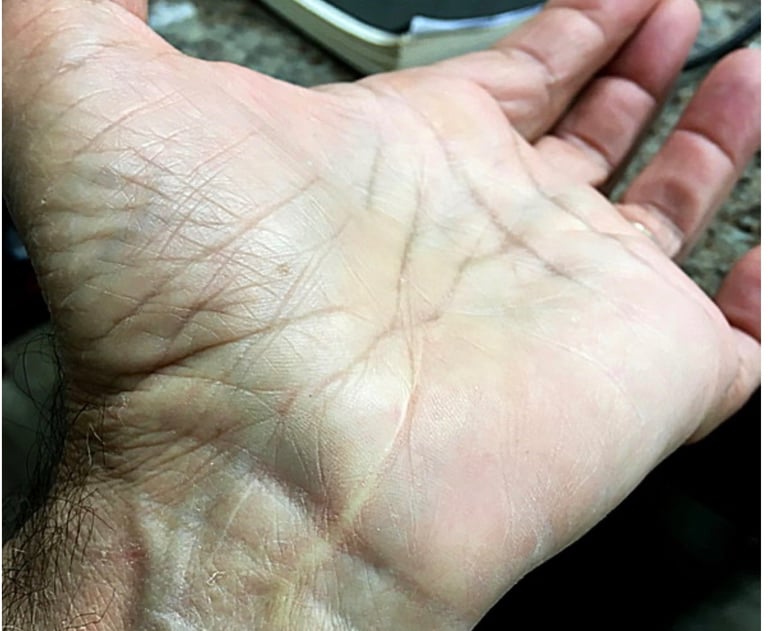

61 years later
That evening my uncle Don came over to see how I was feeling. He said that a thoughtless worker had hidden a piece of banding iron (thin, black-metal strapping about an inch wide) inside one of the tubes instead of disposing of it properly; most likely a joke. It was folded up and out of view, inside the pipe I had pushed onto the shaft.
My uncle told me that previously other workers had been cut the same way and that I should have been cautioned, but my trainer never said a word. This happened in the days before you sued people, so all I was left with was a huge white bandage on my left hand and the most incredible pain I had ever felt in my entire life. I remember thinking, “how do I sue the company that employs my entire family?”
Four days after the accident at the mill, seemingly out of nowhere, once again Ava and Charles came to visit. They had just arrived back in America from England. They especially wanted to visit, since we hadn’t been together since Larry’s death. Of course I was very happy to see them, but certainly my spirits had just been dealt a serious blow, which was quite obvious with my bandaged hand having to be held constantly above my head to prevent the excruciating throbbing from torturing me.
As soon as Charles saw my condition he immediately said that he could help by using a special technique to treat pain that he had learned from L. Ron Hubbard. His offer was more than welcome and we went upstairs to be alone, using the topmost stair as our seat.
After Charles made sure that I was comfortable, he asked me if he could hold my injured hand. Very slowly I brought it down and carefully let him position it between us. With that accomplished he then asked me to use my other hand and with my index finger, show him the exact spot where the pain hurt the most. He explained that he wanted me to “look right through my bandages,” so to speak, and in this way show him precisely where the pain was located. Of course that was the last thing I wanted to do but after some kind words from him, I said I was willing. On my first attempt, rather than feeling any pain like I thought I would, I felt a rush of heat travel down my arm and toward my hand. It even made my forearm break out into a little sweat. For about the next twenty minutes we sat there and over and over again I chased the pain around with my attention, every time being very careful to show him exactly where the pain hurt the most. I was amazed how it jumped all over the place, even in areas where I was not cut.
Next Charles told me that there was a second part to the therapy. Switching his instructions, he repeatedly asked me to reach out to him, first giving him my bandaged left hand, and then my good one. Finally we returned to where we started: chasing the pain around with my attention. Altogether we must have sat on the landing for about an hour and to my great relief, when I came down to show Ava, I felt a thousand times better. I was able to place my hand up or down, or in any position I wanted, with hardly any pain at all. For me, this was about as close to a real miracle as it gets. Nearly 60 years later, just remembering all of this is still breathtaking.
My hand healed quickly and within a month I was as good as new. Charles wasn’t even a medical doctor, yet, just as with his last visit when I had been so impressed with his explanation of niacin and the images of the skeleton on my brother’s skin, once again I had experienced a very remarkable exchange with him—something I had never experienced with any adult before. He may not have been a doctor but there was no doubt in my mind that he had healed my hand. He was now a person I greatly admired and whatever he said I was quite willing to accept it as the absolute truth. Well, he was a doctor of Scientology—their greatest star.
I knew that Ava and Charles would be leaving soon but before they did, Ava invited me to come live with them in California. Once there I would study with several other young men my own age. This definitely seemed more exciting than going to Paul Smith’s Forestry College, but from my father’s point of view, going to California was absolutely the worst decision I could possibly make. He felt, positively, that this was the quickest way for me to ruin my life.
Searching for a satisfactory solution to this predicament, Dad and I finally reached a fair compromise. I agreed to give Paul Smith’s my very best effort for one semester. Then, if I didn’t like it, I could go to California with his blessings.
Sadly, though, college turned out to be more of a nightmare than I had ever imagined. My roommate tried to kill himself, our dormitory was slowly being chopped down by the forestry students, and the teacher who taught my favorite subject (psychology) seemed like a complete idiot. In January the electricity went out in our dormitory and it got so cold that the water in the toilet bowls froze rock solid. Somebody told me it was fifty degrees below zero.
Worst of all, late one night I caught a group of my intoxicated classmates standing in a circle on the third floor of a plush, Lake Placid motel, urinating on the rug in front of the elevators. The only nice thing that happened didn’t even occur on campus and had nothing at all to do with my formal education.
The small campus was picturesquely situated, nestled on the quiet shores of St. Regis Lake. Because I was a full-time student, I discovered that I was allowed to use their canoes whenever I wanted. Ever since I can remember I had been eager to try my hand at rowing one, so at my first opportunity I put one in the water and took off. Needless to say I immensely enjoyed paddling to the other side.
There the lake narrowed with a few deserted vacation homes off to my right and a small stream to my left. I noticed how the aluminum canoe could float in very little water and thought it would be exciting to paddle up the shallow creek, quite curious to see how far I could get.
It was one of those colorful, autumn afternoons without a cloud in the sky. Dipping the wooden oar into the stream, the canoe slid effortlessly across the top of the water. Looking over the side I could see the bottom, just a foot below. All at once, breaking the calm and giving me quite a fright, twenty feet in front of the canoe a mother otter and her two pups dove into the water. Thrilled beyond words to see these rare animals right in front of me, I slowly stood up hoping to get a better view. Temporarily submerged, up out of the crystal clear water they suddenly came, barking like three small seals—their big wet eyes blinking at me, full of innocent curiosity.
*** ** ***
As the large, red and white Trailways pulled into the Los Angeles bus terminal, I had very little idea what lay in store for me. But I wasn’t overly concerned with the details because all I wanted was to be with Charles and Ava, and part of whatever they were doing. At first that was Scientology and later, the Institute of Ability.
Although Charles’ grasp of Scientology was unmatched, serious doubts about it began to bother him. In the mid-sixties when Scientology began boasting about their “OTs” (Operating Thetans), Charles said that their claim was bogus. It was simply a “false carrot” that Scientology was dangling in front of the gullible public; an attempt to entice more people to sign up for their expensive classes.
An Operating Thetan is supposedly an advanced individual with god-like powers who can create or destroy—mass, energy, space, and time. The breaking point came when Charles challenged one of their latest OTs to levitate a small paper clip he held out in the palm of his hand. Of course the man refused.
With their deception thus checked (at least for the moment) Charles officially cut his ties with Scientology and started his own religion, called “Abilitism.” He also began giving away the latest secrets that Scientology was charging high dollars for. Following these events, for over a year, both Charles and my sister, along with myself and anyone else openly aligned with my brother-in-law, were put on very real Scientology “hit list.”
Ava told me that someone actually tried to ambush Charles in Los Angeles but when they failed at that, several people broke in and vandalized our new headquarters in Costa Mesa. Scientologists also shot up a sign and did other damage at the Institute’s desert property near Lucerne Valley. Charles then had a long talk with the FBI and after that, things quieted down considerably between Charles and his former guru.
Eventually Ava and her husband developed their forty-acre retreat into a thriving community. It was here that they perfected their famous Enlightenment Intensives. Over the next few years, hundreds of participants, including such celebrities as Peter Max, would sit for hours on the big blue rug asking one another, “What is the purpose of life?” and, “Tell me what you are?” Over sixty years later, Enlightenment Intensives are still being held in various parts of the world by former students of the Institute of Ability.
In 1966 the Vietnam War finally caught up with me and I was drafted into the United States Marine Corps. Instead of seeing this as a serious problem, Charles saw the perfect opportunity to open a seminary and win me a draft deferment. The actual birth of this seminary took place quite unadorned, as a bunch of us were standing around his kitchen one night.
Charles briefly gave us the initial idea, then pointing to his senior disciples said, “OK, Drew, you’re going to be the seminary’s president. Ed, you are appointed its dean—and Ken, how about you being the registrar?”
(Note: In the early 1980s Ed Riddle was part of Apple’s original team that produced Steve Job’s very first home computer. Ed’s contribution was integrating the mouse & keyboard to the main computer.)
In less than five minutes, this is how the Clarke Seminary officially opened its doors. A large donation by Tobby Clarke greatly expanded the scope of the seminary. Of the many students who would later enroll, I was to be its first, full-time student. My draft deferment lasted until the winter of 1969 when I left the Institute of Ability for good, choosing, instead, to enlist in the United States Air Force.
During my involvement with the Institute of Ability we did all the things that we hoped would enlighten us. We fasted for weeks on end (eating only grapes), went to Love-ins, smoked pot, tried to remember past lives, participated in Enlightenment Intensives, some lasting for twenty-one days, swallowed vast quantities of vitamin pills, drank lots of carrot juice, attended lectures, discussed life with each other, went to flying-saucer conventions, and listened to Charles.
At one point he told each of us, separately, what he thought would most accelerate our spiritual advancement. When it was my turn he told me that I should stand up to my neck in cold water for forty-five minutes, without moving or trying to keep warm.
I agree this now sounds like the ravings of some madman but mind you, Charles was by no means a stupid, starry-eyed charlatan. On the contrary, besides his extraordinary achievements within Scientology, in the early fifties he took an I.Q. test given by the state of California and received the highest score ever recorded. He also worked as a research scientist for the National Bureau of Standards and played a major role in developing the Sidewinder missile.
In Oakland, California, I once asked one of the members of the Institute of Ability (Dr. Ed Dalton. PhD) what he thought about Charles. I had a lot of respect for Ed and had approached him for his opinion because he had advanced degrees in both math and physics. He also knew Charles quite well.
I told Ed that perhaps my high opinion of Charles was way out of proportion; after all, I had more or less idolized him since I was sixteen years old. But Ed told me that he had the same feelings about Charles that I did. He had only met one person (a professor at Harvard) who even came close to Charles’ ability, knowledge, and charisma. These were more reasons I respected Charles so much and why, on my twenty-first birthday, close to midnight, I nearly froze to death in the frigid water off Newport Beach, California. After all these years and now thinking back to that night, what really comes to mind is how I was very lucky to have not been attacked by a shark.
The theology taught by Charles Berner was called, “Abilitism” and had as its centerpiece the bold declaration that, “You Are God.” He spelled this out very clearly and to make this theory gel, both he and Ava expertly designed the Enlightenment Intensives to give people a kind of spiritual-crash course about who they really were. But as my spiritual master, Shrila Prabhupada has taught me, without God in the formula all you have is a long string of zeros, regardless of one’s big brain. Without God, life can be compared to the result you would get from owning an expensive camera and after shooting the most important pictures of your life, discovering that you had forgotten to put the film in it.
What Charles was teaching us was actually the denial of God’s very existence. Not only did this denial insult the teachings of all the saints, he was denying common sense. Just consider, for a moment, a bird’s nest. We’ve all held one in our hand and they can be seen adorning many trees.
The answer to the question: “Where did the nest come from?” is so obvious that nobody even bothers thinking about it. Are there other possibilities to this question, besides the straight-forward answer that “a bird made it?”
Well, for one, perhaps a small whirlwind gathered all those little twigs and spinning around, lifted everything up onto the branch, leaving behind the completed nest. But I’ve never seen or heard of anything like that happening and actually it’s pretty hard to beat the first answer: “Yes, a bird made the nest.” When we see a bird’s nest, automatically, common sense tells us that a bird made it.
But if it’s so obvious that someone made the nest, then what about the bird, itself, that is a million times more complex than any nest? What about the bird’s creator?
There is a similar idea found in a story about Sir Isaac Newton and one of his friends. Although Newton firmly believed in God, his friend was an atheist. One day while Sir Isaac Newton was away from his laboratory, this gentleman came over to visit. Finding no one in, the man ventured into one of the back rooms. In a corner he discovered an intricate replica of our solar system, complete with the sun, planets, and moons. Furthermore, the whole display was geared in such a way that by turning a handle the exhibit would rotate, making all the planets move according to their various journeys around the sun.
When he finally caught up with Sir Isaac Newton, the man asked, “By the way, who built that fantastic solar system I saw in your laboratory this morning?” But Isaac Newton refused to say. He simply told his friend that no one made it.
“‘No one,’ you say, but how can that be? Tell me who made it. You cannot say, ‘No one made it,’ when obviously somebody did! So please tell me who made the thing?”
Hearing his friend thus speak, Sir Isaac Newton shot back, “How is it, my good Sir, that you can stand here insisting that someone made that simple gadget and yet you deny the real thing—the sun, the moon, and the stars which you see with your own two eyes? How is it you deny that someone made them?”
The debt that I owe to my sister and Charles will be difficult to repay. Besides providing me with a place to live for several years, they taught me to think for myself and appreciate that “there’s more to life than meets the eye.” But most important, in 1967 Charles was the first person to tell me about Lord Krishna. He briefly mentioned “these two ‘cats,’ Krishna and Arjuna,” who went roaming all over ancient India causing havoc with their spiritual powers. Eight years later when I needed serious answers to my own questions, I was able to turn to Lord Krishna, remembering Him from that flippant lecture, years back.
In 1971 Charles traveled to India, visiting various places of pilgrimage. I was unable to accompany him but later I learned that while there he met Swami Kripalvanandji. Charles accepted this Indian Saint as his spiritual master and was given the name Yogeswara Muni.
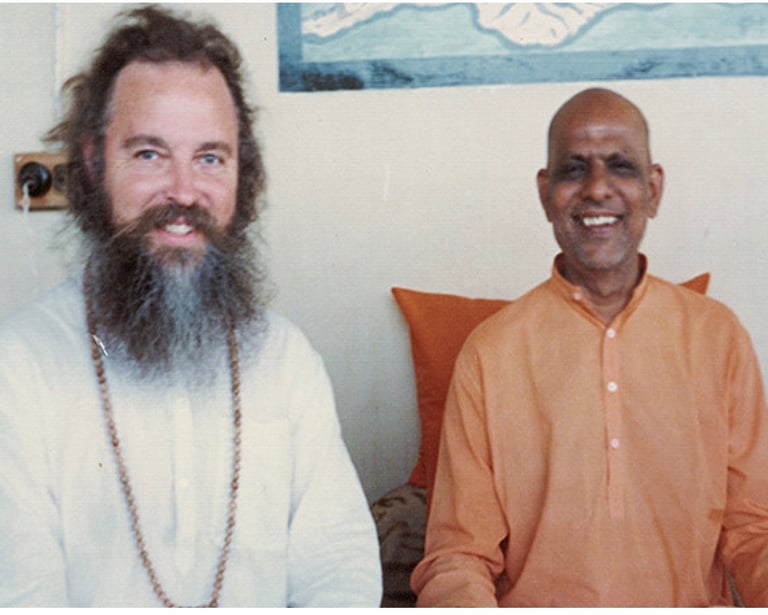

H. Charles Berner (Yogeswara Muni)
and Swami Kripalvanandji
(Note: Yogeswara Muni moved to Australia where he lived for many years, practicing his faith until passing away. In the early 60s Charles took this picture of Ava while studying Scientology in England. Next to it is a picture that Ava took of Charles, exactly as I remember him. Charles was my first guru.)
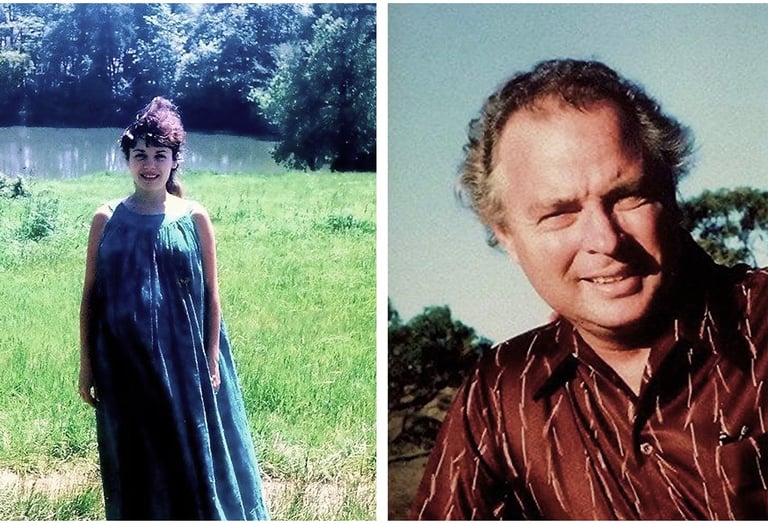

Ava & Charles Berner
